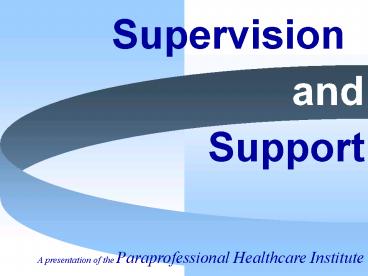Supervision - PowerPoint PPT Presentation
1 / 18
Title:
Supervision
Description:
... consumers/ agency providers assist Personal Assistance Workers manage multiple job demands ... Do not receive on-the-job training in supervision ... – PowerPoint PPT presentation
Number of Views:49
Avg rating:3.0/5.0
Title: Supervision
1
Supervision
and
Support
A presentation of the Paraprofessional Healthcare
Institute
2
Support and Supervision
- Improve quality of consumer/ worker
relationship - Enhance worker retention
- Enhance service quality
3
Types of support for Direct Care Workers
- Emotional Supports
- Practical Supports
4
Good Outcomes
What can effective supervision do?
5
Effective supervision can
- Build communication skills between worker and
consumer - Enhance consumer/worker relationship
- Reinforce training and direction
- Orient new employee to the job
- Build employees problem-solving skills
- Help consumers/ agency providers assist
Personal Assistance Workers manage multiple
job demands
6
Effective supervision can
- Model acceptable behaviors
- Reduce conflict with clients and family
- Prevent dismissals and resignations
- Help employees balance work and family demands
- Assist workers and consumers in managing
cultural differences
7
Current DynamicsAgency supervisors and consumer
employers often lack experience and/or training
in supervision.
8
Frontline supervisors in agencies
- Have intensive scheduling and administrative
demands - Come from clerical or direct care jobs
- Do not receive on-the-job training in
supervision - Can be critical or demeaning towards direct
care workers - Lack skills to guide workers in
problem- solving on the job
9
Consumer Employers
- Are rarely trained in supervision
- May be trained in hiring, firing and managing
fiduciary issues - Are often self-taught in overseeing their
employee
10
How can supervision be different?
A Coaching Model
- Balances support and accountability
- Provides direction and limits without
criticism - Establishes acceptable behavior
- Guides employee in problem solving
- Builds on employees intrinsic motivation for
the job - Diffuses Stress
11
Resources
Existing resources on supervision that PHI has
learned from stakeholders
- Locally developed through the ILC for consumer
employers (Focuses on management and fiduciary
responsibilites) - Wide variability in services and sophistication
in agencies - Not well-coordinated or distributed
- Focus on management and fiduciary
responsibilities
12
Teaching Supervision
How can we teach consumers and agency supervisors
how to supervise?
- PHI is identifing existing resources through
stakeholder interviews across the US - PHI is developing supervisory curriculum for
teaching diverse audiences
- Within agencies
- In consumer homes
- Through ILCs
- Using web broadcasting
Curriculum will be disseminated to all Systems
Change Grantees
13
Practical Supports Assist employees in becoming
successful at work
14
Why do Direct Care Workers need financial and
tangible supports?
- Insufficient pay
- Fewer resources to manage family stresses
15
Personal Assistance Workers are
- Among the working poor
- Single heads of households
- Lack of medical insurance
- More likely to rely on public support programs
- Medicaid
- Food Stamps
- Transportation Assistance
16
Types of practical supports
- Child care
- Transportation assistance
- Affordable housing
- Food Stamps
- Paid health care and other paid benefits
- ESL or GED courses
17
Employer Role
- In linking the employee to supports in the
community - Employer is not a social worker
- Employer can link to resources in the
community - Government agencies can play an important role
in linking workers to private/public supports in
the community and state
18
For additional information please contact
Paraprofessional Healthcare Institute 349 East
149th Street, Suite 401 Bronx, NY 10451 Email
info_at_paraprofessional.org Or National
Clearinghouse on the Direct Care Workforce Phone
(718) 402-4138 Info_at_directcareclearinghouse.org ww
w.directcareclearinghouse.org






























![READ[PDF] Session Notes, Referral Log, Supervision Notes & Group Notes PowerPoint PPT Presentation](https://s3.amazonaws.com/images.powershow.com/10086898.th0.jpg?_=20240727079)
![READ[PDF] Session Notes, Referral Log, Supervision Notes & Group Notes PowerPoint PPT Presentation](https://s3.amazonaws.com/images.powershow.com/10086899.th0.jpg?_=20240727079)